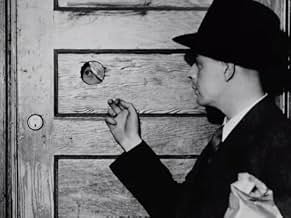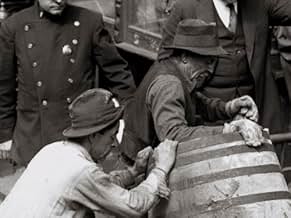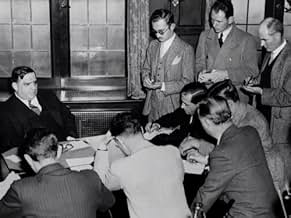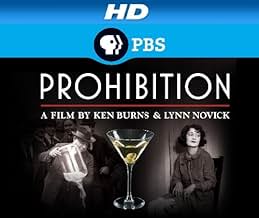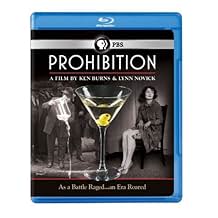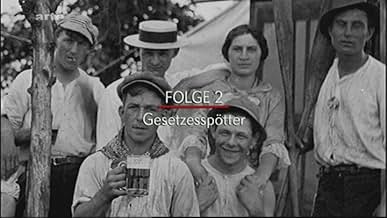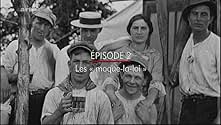IMDb RATING
8.2/10
3.5K
YOUR RATING
The story of the American activist struggle against the influence of alcohol, climaxing in the failed early 20th century nationwide era when it was banned.The story of the American activist struggle against the influence of alcohol, climaxing in the failed early 20th century nationwide era when it was banned.The story of the American activist struggle against the influence of alcohol, climaxing in the failed early 20th century nationwide era when it was banned.
- Won 1 Primetime Emmy
- 1 win & 3 nominations total
Browse episodes
Featured reviews
Prohibition took place in the early 1900's, was unpopular, and was repealed. That was the extent of my knowledge on prohibition. Ken Burns proved that such a big part of our country's history is worth taking a closer look at.
The storytelling is excellent, with interviews of and narration by folks you'll likely recognize. The archival footage is eye-opening and heartbreaking. The comic relief is perfectly timed, and the facts presented here linger on the mind long after the TV is off.
Personal preference will dictate whether the film's length outlasts its charm. I usually like things short and sweet, but I couldn't hold myself to a single episode in one sitting. However, at 5 hours it'll probably wear down the patience of some viewers.
The only other downside I can think of is that some points are overly expounded upon, while other enticing tidbits will be mentioned briefly but not fully exemplified. I almost doubled the length of one episode by continuously pausing and googling something for more clarification.
Of course, that could've been Ken's plan all along.
The storytelling is excellent, with interviews of and narration by folks you'll likely recognize. The archival footage is eye-opening and heartbreaking. The comic relief is perfectly timed, and the facts presented here linger on the mind long after the TV is off.
Personal preference will dictate whether the film's length outlasts its charm. I usually like things short and sweet, but I couldn't hold myself to a single episode in one sitting. However, at 5 hours it'll probably wear down the patience of some viewers.
The only other downside I can think of is that some points are overly expounded upon, while other enticing tidbits will be mentioned briefly but not fully exemplified. I almost doubled the length of one episode by continuously pausing and googling something for more clarification.
Of course, that could've been Ken's plan all along.
Daniel Okrent's "Last Call: The Rise and Fall of Prohibition" and Ken Burns and Lynn Novick's "Prohibition" mini-series were two similar projects that began together resulting in two different end products. Together, both provide a rather detailed account not only of Prohibition's place in American history, but the events leading up to such, the results of repeal and the long-lasting societal impact of the entire matter. Separate, both are still strong, informative and entertaining yet each tend to focus on different themes that sometimes do not intermingle and the result is noticeable.
Ken Burns, in his trademarked fashion, intermingles fantastically- original photos and video with colorful interviews from subject-matter experts and first-hand histories over-laced with celebrity voice-overs, makes learning hip and brings about a passion for a dark, but necessary, time in American history. Burns' documentary was too light in certain instances where a deeper look at American history would have benefited the story. Okrent's novel definitely fills in such details that Burns either ignored or edited out but was definitely too heavy at times with whole sections coming across as a historical text book rather than an entertaining narrative.
Burns, and Okrent as well, enlighten 21st-Century audiences to the fact that Prohibition, what can be now considered a silly arrangement, was not only responsible for the rise of Jazz, the introduction of mixed drinks and the invention of speed boats but also led to very beginnings of the Civil Rights Movement and the outright success of Women's Suffrage.
Naturally, Burns provides much attention to that of the gangsters of the era, particularly Chicago's Al Capone. But again, he provides just enough details for a satisfactory display of information yet fails to get deeper. Similarly, this occurs when discussing the role of the Church and the Prohibition movement. Dry Congressmen and Senators knew how to convince their Baptist and Methodist ministers to use the pulpit to condemn the evils of alcohol, particularly in the Mid-West states.
Likewise, Prohibition was an outcry not just against alcohol but also against the rise of poor immigrants filling America's urban centers. The Irish, the Germans, the Italians, all known for enjoying wine and spirits, and all Catholics, became a scary threat for "decent, Protestant country folks". Cutting off immigrants from their alcohol was a way to ensure that these new Americans were productive members of society, not a burden of filthy drunkards. Burns did not spend too much time on these ideals.
However, Burns attention to detail and crafting of a narrative tale is shown in his vision and with what is presented. He does keep entertainment at the forefront of his documentary, much like what he has done in the past, especially with his must-see Baseball series. Some indirect humor is presented with history playing the comedian to a more naïve time. Burns does get political with some of his views, but at no time are such views sobering enough to prevent the viewer from seeking out a drink.
Ken Burns, in his trademarked fashion, intermingles fantastically- original photos and video with colorful interviews from subject-matter experts and first-hand histories over-laced with celebrity voice-overs, makes learning hip and brings about a passion for a dark, but necessary, time in American history. Burns' documentary was too light in certain instances where a deeper look at American history would have benefited the story. Okrent's novel definitely fills in such details that Burns either ignored or edited out but was definitely too heavy at times with whole sections coming across as a historical text book rather than an entertaining narrative.
Burns, and Okrent as well, enlighten 21st-Century audiences to the fact that Prohibition, what can be now considered a silly arrangement, was not only responsible for the rise of Jazz, the introduction of mixed drinks and the invention of speed boats but also led to very beginnings of the Civil Rights Movement and the outright success of Women's Suffrage.
Naturally, Burns provides much attention to that of the gangsters of the era, particularly Chicago's Al Capone. But again, he provides just enough details for a satisfactory display of information yet fails to get deeper. Similarly, this occurs when discussing the role of the Church and the Prohibition movement. Dry Congressmen and Senators knew how to convince their Baptist and Methodist ministers to use the pulpit to condemn the evils of alcohol, particularly in the Mid-West states.
Likewise, Prohibition was an outcry not just against alcohol but also against the rise of poor immigrants filling America's urban centers. The Irish, the Germans, the Italians, all known for enjoying wine and spirits, and all Catholics, became a scary threat for "decent, Protestant country folks". Cutting off immigrants from their alcohol was a way to ensure that these new Americans were productive members of society, not a burden of filthy drunkards. Burns did not spend too much time on these ideals.
However, Burns attention to detail and crafting of a narrative tale is shown in his vision and with what is presented. He does keep entertainment at the forefront of his documentary, much like what he has done in the past, especially with his must-see Baseball series. Some indirect humor is presented with history playing the comedian to a more naïve time. Burns does get political with some of his views, but at no time are such views sobering enough to prevent the viewer from seeking out a drink.
This is the latest documentary series from Ken Burns--the docu-god for Public Broadcasting. Not surprisingly, with his amazing reputation for perfection, he was able to once again get many of America's top actors to provide their voice talents to the shows--such as Tom Hanks, Sam Waterston and Blythe Danner. And, like so many PBS documentaries, Peter Coyote narrates more than capably.
The miniseries consists of three episodes. The first is about the background leading to Prohibition--the temperance movement and problems with alcohol over-consumption. It also ends with the implementation of the Constitutional Amendment. Part Two is about the practical aspects of the law. The difficulty in enforcement is due to a lack of widespread support, loopholes in the law as well as the way the law actually ENCOURAGED the growth of organized crime. Part Three is about the rising dislike of the law that led to its repeal.
Overall, it's yet another very good series by Ken Burn and is among the best shows you can find on the topic. Well worth your time--and it manages to make an educational show fun...of sorts.
The miniseries consists of three episodes. The first is about the background leading to Prohibition--the temperance movement and problems with alcohol over-consumption. It also ends with the implementation of the Constitutional Amendment. Part Two is about the practical aspects of the law. The difficulty in enforcement is due to a lack of widespread support, loopholes in the law as well as the way the law actually ENCOURAGED the growth of organized crime. Part Three is about the rising dislike of the law that led to its repeal.
Overall, it's yet another very good series by Ken Burn and is among the best shows you can find on the topic. Well worth your time--and it manages to make an educational show fun...of sorts.
I've always wondered how the US ever passed laws prohibiting alcohol. Such an amazingly common thing today, it would be like banning caffeine or soda. This six hour story is told well from all sides and it provides clarity as to the insane and radical motives behind the Volstead Act and how it backfired in every way. While the video and photos are all rather dated being from the 1910s and 1920s, the interviews of experts, historians and people with real-life stories really come together well. The narration is also great and uses some of the best names in the film business.
This is a long series, about 6 hours. Ken Burns' direction is poignant and well-paced. It gives you time to think about the meaning and the historical impact of each chapter of this story which touches on many decades.
I feel I know understand an important part of American history that never made sense to me. Concepts like "Bootleggers and Baptists" being aligned and the role of the gangsters in society become crystal clear after viewing this film. I had no idea how vicious and immoral the attacks on Al Smith were by the Herbert Hoover camp. Politics and police seem violently corrupt in this era. You learn a lot about life, laws, religion and politics in a difficult and bitter era (the Great Depression). Most importantly, you are reminded of the fact that US was built on Freedoms--and Prohibition is such an amazing violation of this. It's a historical guidepost to preserving our freedoms going forward.
The story of the Roaring 20s, flappers, the speakeasy, the rum-runners, and ironically, how the post-prohibition era was favorable to women and equality and stories I'd never imagined.
FDR had three priorities when he took office: 1) regulate the banks, 2) cut federal spending, 3) legalize beer. He won by a landslide. On a funny note, Utah voted to repeal the Volstead Act rather quickly. Amazing given that that state has spend the last 80 years trying to restrict it! This three DVD series is worthy of a weekend of your time. Thanks PBS for this fine historical film and Ken Burns for another amazing tale.
This is a long series, about 6 hours. Ken Burns' direction is poignant and well-paced. It gives you time to think about the meaning and the historical impact of each chapter of this story which touches on many decades.
I feel I know understand an important part of American history that never made sense to me. Concepts like "Bootleggers and Baptists" being aligned and the role of the gangsters in society become crystal clear after viewing this film. I had no idea how vicious and immoral the attacks on Al Smith were by the Herbert Hoover camp. Politics and police seem violently corrupt in this era. You learn a lot about life, laws, religion and politics in a difficult and bitter era (the Great Depression). Most importantly, you are reminded of the fact that US was built on Freedoms--and Prohibition is such an amazing violation of this. It's a historical guidepost to preserving our freedoms going forward.
The story of the Roaring 20s, flappers, the speakeasy, the rum-runners, and ironically, how the post-prohibition era was favorable to women and equality and stories I'd never imagined.
FDR had three priorities when he took office: 1) regulate the banks, 2) cut federal spending, 3) legalize beer. He won by a landslide. On a funny note, Utah voted to repeal the Volstead Act rather quickly. Amazing given that that state has spend the last 80 years trying to restrict it! This three DVD series is worthy of a weekend of your time. Thanks PBS for this fine historical film and Ken Burns for another amazing tale.
My favorite comment in this documentary is offered by Pete Hamill, American journalist, novelist and essayist, who said basically if you want people to brush their teeth, pass a law banning toothpaste. And then people will do everything they can to acquire toothpaste illegally, and they'll brush their teeth just to spite the law. The unforeseen consequence of Prohibition is that once you take away a person's right to do something that people have always done, people will feel the desire to want it much more intensely, in the same way if you deny a child all sweets, the kid will be sneaking chocolate inside his jacket sleeves. Hamill later says he doesn't drink, but he would probably take a swig in front of a government building if the law ever forbade him from doing it. Encouraging moderation is not the same as banning something completely.
The other comment worth noting concerns repeal crusader Pauline Sabin who had been entrenched in republican politics prior to 1928. Republican congressmen would vote to adhere to the strictest of prohibition laws as laid out by the Volstead Act and then go to one of Sabin's parties demanding a drink. She concluded that the United States had become "a Nation of Hypocrites", which is the title of the third installment of Burn's documentary. Sabin becomes an unlikely hero who would sway the country against Prohibition and the eventual repeal of the 18th Amendment of the Constitution, the only amendment so dignified. Ironically, Daniel Okrent points out that today alcohol is somewhat harder to come by than during Prohibition because of liquor laws, underage drinking laws, etc. When alcohol was strictly forbidden, there was nothing in place to regulate it, except for raids on speakeasies and private distilleries.
Based in part on Daniel Okrent's "Last Call: The Rise and Fall of Prohibition", Ken Burns and Lynn Novick's "Prohibition" is a thoroughly entertaining, simultaneously humorous and "sobering" look at one of the strangest episodes in American legal history. The documentary is in three parts, the first chronicling the birth of the temperance movement which began in the 1820's almost a century before the ratification of the 18th Amendment. No question that alcohol was a problem for some people, mostly among the rural poor, but the temperance movement decided alcohol itself was the problem and vowed its eradication by the late 19th century. The first part ends with the ratification of the 18th Amendment to the US Constitution prohibiting not only the sale but importation of alcohol. Part two concerns the passage of the Volstead Act designed to enforce the amendment, and the immediate consequences of trying to stop people from drinking, and the antithetical results, such as lawlessness and bribery. The third and most sobering of the episodes chronicles many of the unintended consequences, such as the violence erupting in Chicago and the night club craze. The documentary ends with the movement for the repeal of the 18th Amendment.
The unforeseen catastrophes of the 18th Amendment which were designed to heighten American morality and assuage drunkenness turned America into one of the most alcoholic-driven nations among the industrialized world. Americans drank more booze, partied more, got more drunk, and flaunted the law more often during Prohibition than at any other time in the nation's history since after the Civil War, even as compared to the present time. Possibly only the 1960's are somewhat comparable to the mayhem of the 1920's.
The irony of ironies that the decade begun by the Temperance Movement's victory with the passage of the 18th Amendment to the US Constitution in 1919 would be nicknamed the Roarding Twenties and the Jazz Age. This was not a decade known for drinking milk. This was a decade characterized by cocktail glasses in the hands of flappers dancing on tables to the evocative music of Duke Ellington and Count Basie. Men would be raising giant mugs of frothy beer in underground establishments called speakeasies. Only Prohibition allowed the likes of Al Capone and Lucky Luciano to become wealthy gangsters, almost movie stars by today's standards. The leaders of the Temperance Movement, particularly the Woman's Christian Temperance Union and the Anti-Saloon League, were appalled when their daughters ran off to speakeasies and night clubs to partake of the forbidden fruit. Strangely, Prohibition helped usher in the Night Club culture of America which has continued unabated ever since. All the great night clubs famous for their booze, music, and dancing such as the Cotton Club and the Stork Club, were incepted when alcohol was supposed to be illegal.
For some reason, I didn't think Prohibition permeated into so many aspects of American life during its enforcement from 1920 through 1932. People could open small businesses in their basements and make a fortune through bootlegging, and then be hauled away under the Volstead Act. The rise of the Chicago Gang syndicate became a prototype for similar syndicates across the country, all vying for their bootlegging territory. At one point, citizens were legally compelled to snitch on neighbors suspected of bootlegging. The story as presented by Burns/Novick is as compelling as any action thriller being produced today. A great movie of American history, with all the elements that make a great story. Essentially it's a legal thriller with sex, violence, and lots of booze. Lots of it.
The other comment worth noting concerns repeal crusader Pauline Sabin who had been entrenched in republican politics prior to 1928. Republican congressmen would vote to adhere to the strictest of prohibition laws as laid out by the Volstead Act and then go to one of Sabin's parties demanding a drink. She concluded that the United States had become "a Nation of Hypocrites", which is the title of the third installment of Burn's documentary. Sabin becomes an unlikely hero who would sway the country against Prohibition and the eventual repeal of the 18th Amendment of the Constitution, the only amendment so dignified. Ironically, Daniel Okrent points out that today alcohol is somewhat harder to come by than during Prohibition because of liquor laws, underage drinking laws, etc. When alcohol was strictly forbidden, there was nothing in place to regulate it, except for raids on speakeasies and private distilleries.
Based in part on Daniel Okrent's "Last Call: The Rise and Fall of Prohibition", Ken Burns and Lynn Novick's "Prohibition" is a thoroughly entertaining, simultaneously humorous and "sobering" look at one of the strangest episodes in American legal history. The documentary is in three parts, the first chronicling the birth of the temperance movement which began in the 1820's almost a century before the ratification of the 18th Amendment. No question that alcohol was a problem for some people, mostly among the rural poor, but the temperance movement decided alcohol itself was the problem and vowed its eradication by the late 19th century. The first part ends with the ratification of the 18th Amendment to the US Constitution prohibiting not only the sale but importation of alcohol. Part two concerns the passage of the Volstead Act designed to enforce the amendment, and the immediate consequences of trying to stop people from drinking, and the antithetical results, such as lawlessness and bribery. The third and most sobering of the episodes chronicles many of the unintended consequences, such as the violence erupting in Chicago and the night club craze. The documentary ends with the movement for the repeal of the 18th Amendment.
The unforeseen catastrophes of the 18th Amendment which were designed to heighten American morality and assuage drunkenness turned America into one of the most alcoholic-driven nations among the industrialized world. Americans drank more booze, partied more, got more drunk, and flaunted the law more often during Prohibition than at any other time in the nation's history since after the Civil War, even as compared to the present time. Possibly only the 1960's are somewhat comparable to the mayhem of the 1920's.
The irony of ironies that the decade begun by the Temperance Movement's victory with the passage of the 18th Amendment to the US Constitution in 1919 would be nicknamed the Roarding Twenties and the Jazz Age. This was not a decade known for drinking milk. This was a decade characterized by cocktail glasses in the hands of flappers dancing on tables to the evocative music of Duke Ellington and Count Basie. Men would be raising giant mugs of frothy beer in underground establishments called speakeasies. Only Prohibition allowed the likes of Al Capone and Lucky Luciano to become wealthy gangsters, almost movie stars by today's standards. The leaders of the Temperance Movement, particularly the Woman's Christian Temperance Union and the Anti-Saloon League, were appalled when their daughters ran off to speakeasies and night clubs to partake of the forbidden fruit. Strangely, Prohibition helped usher in the Night Club culture of America which has continued unabated ever since. All the great night clubs famous for their booze, music, and dancing such as the Cotton Club and the Stork Club, were incepted when alcohol was supposed to be illegal.
For some reason, I didn't think Prohibition permeated into so many aspects of American life during its enforcement from 1920 through 1932. People could open small businesses in their basements and make a fortune through bootlegging, and then be hauled away under the Volstead Act. The rise of the Chicago Gang syndicate became a prototype for similar syndicates across the country, all vying for their bootlegging territory. At one point, citizens were legally compelled to snitch on neighbors suspected of bootlegging. The story as presented by Burns/Novick is as compelling as any action thriller being produced today. A great movie of American history, with all the elements that make a great story. Essentially it's a legal thriller with sex, violence, and lots of booze. Lots of it.
Did you know
- TriviaAlthough the documentary gives the etymology of the term 'bootlegging' (people selling illegal liquor from flasks that they kept in their boot legs), the origin of the term 'speakeasy' is not further explained. According to the Etymology Dictionary, these illegal liquor saloons were called 'speakeasies' "because of the practice of speaking quietly about such a place in public, or when inside it, so as not to alert the police or neighbors".
- ConnectionsFeatured in CBS 11 News: Episode dated 17 August 2011 (2011)
- How many seasons does Prohibition have?Powered by Alexa
Details
- Runtime1 hour
- Color
- Sound mix
- Aspect ratio
- 16:9 HD
Contribute to this page
Suggest an edit or add missing content

Top Gap
By what name was Prohibition, une expérience américaine (2011) officially released in Canada in English?
Answer
